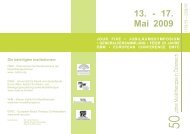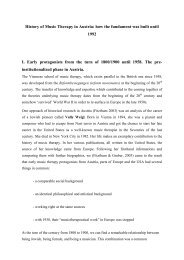music therapy in austria - WIM - Wiener Institut für Musiktherapie
music therapy in austria - WIM - Wiener Institut für Musiktherapie
music therapy in austria - WIM - Wiener Institut für Musiktherapie
Create successful ePaper yourself
Turn your PDF publications into a flip-book with our unique Google optimized e-Paper software.
MUSIC THERAPY IN AUSTRIAHistory1959 - 1970In 1959 the first European <strong>music</strong> <strong>therapy</strong> tra<strong>in</strong><strong>in</strong>g program was <strong>in</strong>itiated at the formerAcademy of Music and Perform<strong>in</strong>g Arts <strong>in</strong> Vienna.In the very first years (1959 - 1970) multi-discipl<strong>in</strong>ary structures were formed betweenimportant cl<strong>in</strong>ics and the Academy. Typical for the Viennese <strong>music</strong> <strong>therapy</strong> was thismulti professional aspect, may be because Vienna was famous both for its <strong>music</strong>tradition and its psycho<strong>therapy</strong>.At the beg<strong>in</strong>n<strong>in</strong>g from this period the science of world harmonics (after the model ofthe Swedish school of Aleks Pontvik) built the theoretical background of education.Pioneers <strong>in</strong> the field of <strong>music</strong> <strong>therapy</strong> were: Editha Koffer-Ullrich, Albert<strong>in</strong>e Wesetzky,Ilse Casellitz, Georg We<strong>in</strong>hengst, Margit Schneider, Stella Mayr and Alfred Schmölz.1970 - 1992From 1970 to 1992 Alfred Schmölz headed the "Lehrgang für <strong>Musiktherapie</strong>".Theoretical and practical backgrounds changed <strong>in</strong> this period. In close co-operationwith famous medical directors (Erw<strong>in</strong> R<strong>in</strong>gel, Andreas Rett, Otto Hartmann / RaoulSch<strong>in</strong>dler) practical studies <strong>in</strong> the three most important fields psycho-somatic,paediatrics and psychiatry were established.Characteristics <strong>in</strong> this time were:* shift from receptive to active methods* development of "<strong>music</strong>al partner play" (“musikalisches Partnerspiel”, Schmölz)* emphasis on therapeutic relationship* <strong>music</strong> <strong>therapy</strong> oriented <strong>in</strong>trospection tra<strong>in</strong><strong>in</strong>g (“ Lehr-<strong>Musiktherapie</strong>”)1992 - 2003A def<strong>in</strong>ite direction towards psycho<strong>therapy</strong>, based ma<strong>in</strong>ly on psychodynamic andhumanistic methods, took place <strong>in</strong> 1992, when the "Lehrgang" formally was changed<strong>in</strong>to a "Kurzstudium". Also the Academy was transformed <strong>in</strong>to University of Music andPerform<strong>in</strong>g Art <strong>in</strong> 1998. S<strong>in</strong>ce 1992 <strong>music</strong> <strong>therapy</strong> is <strong>in</strong>cluded <strong>in</strong> the Austrianpsycho<strong>therapy</strong> law as a “Quellenberuf” ( source profession).Personal <strong>therapy</strong>, as well <strong>in</strong>dividual (90h) as <strong>in</strong> group (180h), and practise underpermanent supervision (650h) of a <strong>music</strong> therapist (who works for University, whatmeans only for the students!) <strong>in</strong> more than 4 fields characterise the <strong>music</strong> <strong>therapy</strong>tra<strong>in</strong><strong>in</strong>g.Obligatory <strong>in</strong>ternships are <strong>in</strong> the fields of the neuro-psychiatry for children andjuveniles, psychosomatic, and psychiatry. For alternative <strong>in</strong>ternships, students canchoose between neurological rehabilitation, psychosomatic (children), specialeducation school, paediatric, elderly people, people with learn<strong>in</strong>g disabilities, neonatology.From 2003 on the new law for Austrian universities enables master theses now and<strong>in</strong> future a Ph.D. study of <strong>music</strong> <strong>therapy</strong>. A new contract of cooperation with the
University of Medic<strong>in</strong>e is just signed and will give <strong>music</strong> <strong>therapy</strong> new impulsesconcern<strong>in</strong>g <strong>in</strong>struction and science.ResearchTraditionally there has not been much empirical research on <strong>music</strong> <strong>therapy</strong> <strong>in</strong>Austria, apart from the work that is done for diploma theses. Recently, however,there has been an <strong>in</strong>creas<strong>in</strong>g <strong>in</strong>terest <strong>in</strong> research, and Austrian <strong>music</strong> therapists are<strong>in</strong>creas<strong>in</strong>gly present at national and <strong>in</strong>ternational conferences on <strong>music</strong> therapistsand psychotherapists. Christian Gold has done empirical research on the efficacyand effectiveness of <strong>music</strong> <strong>therapy</strong> <strong>in</strong> the field of psychiatry as part of his PhDtra<strong>in</strong><strong>in</strong>g <strong>in</strong> <strong>music</strong> <strong>therapy</strong> at Aalborg University. Dorothea Oberegelsbacher has donean <strong>in</strong>vestigation <strong>in</strong>to <strong>music</strong> <strong>therapy</strong> with a disabled adult for her doctorate degree <strong>in</strong>psychology at Vienna University, and has recently done research on the work<strong>in</strong>gfactors of <strong>music</strong> <strong>therapy</strong> with psychosomatic patients. Dorothee Storz has developeda model for focused short-term <strong>music</strong> <strong>therapy</strong> <strong>in</strong> psychiatry and Elena Fitzthum hasdone historical research on the roots of Austrian <strong>music</strong> <strong>therapy</strong> before 1959, both didthis as part of their doctoral tra<strong>in</strong><strong>in</strong>g <strong>in</strong> <strong>music</strong>ology at the Music University Hamburg(parts of this paragraph cited from Gold, 2003). Furthermore, Johanna Wimmer-Illnerhas done a s<strong>in</strong>gle-case study on <strong>music</strong> <strong>therapy</strong> and relationship for her diplomatheses <strong>in</strong> psychology at Vienna University.Tra<strong>in</strong><strong>in</strong>g CourseUniversität für Musik und darstellende KunstAnton von Webernplatz 1A 1030 Wienmusiktherapie@mdw.ac.atAustrian members of the EMTCÖBMThe Austrian Association of Professional Music Therapists (ÖBM) was founded <strong>in</strong>1984 and counts about 100 members.The functions are:- to promote legislation <strong>in</strong> order to protect the professional image- to obta<strong>in</strong> state recognition- to organise cont<strong>in</strong>u<strong>in</strong>g education- to promote research, national and <strong>in</strong>ternational contacts and jobsÖsterreichischer Berufsverband der MusiktherapeutInnenPottendorferstr. 1/11, 1120 Wien (Vienna)oebm@teler<strong>in</strong>g.athttp://members.teler<strong>in</strong>g.at/oebm
<strong>WIM</strong>The "<strong>Wiener</strong> <strong>Institut</strong> für <strong>Musiktherapie</strong>" (<strong>WIM</strong>) was founded <strong>in</strong> 1997. The purpose isto promote the autonomy of <strong>music</strong> <strong>therapy</strong> <strong>in</strong> Austria and to <strong>in</strong>tegrate <strong>music</strong> <strong>therapy</strong><strong>in</strong>to the field of psycho<strong>therapy</strong> as a separate method. The three leaders of thisprivate <strong>in</strong>stitute created a book series titled “<strong>Wiener</strong> Beiträge zur <strong>Musiktherapie</strong>”.Dr. Elena Fitzthum (fitzthum@aon.at), Dr. Dorothea Oberegelsbacher(oberegelsbacher@mdw.ac.at) and Dr. Dorothee Storz (storz@mdw.ac.at).BooksFitzthum,E. , Oberegelsbacher, D., Storz, D. (Ed.). 1997. <strong>Wiener</strong> Beiträge zur<strong>Musiktherapie</strong>. Weltkongresse Wien – Hamburg 1996. Edition Praesens. WienÖsterreichischer Berufsverband der MusiktherapeutInnen, ÖBM. (Ed.). 2000. <strong>Wiener</strong>Beiträge zur <strong>Musiktherapie</strong>. Band 2. Symposium Bilder e<strong>in</strong>er Landschaft. EditionPraesens. WienOberegelsbacher, D., Storz, D. (Ed.). 2001. <strong>Wiener</strong> Beiträge zur <strong>Musiktherapie</strong>. Band3. Theorie und kl<strong>in</strong>ische Praxis. Edition Praesens. WienStorz, D. 2003. <strong>Wiener</strong> Beiträge zur <strong>Musiktherapie</strong>. Band 4. Fokale <strong>Musiktherapie</strong>.Edition Praesens. WienFitzthum, E. 2003. <strong>Wiener</strong> Beiträge zur <strong>Musiktherapie</strong>. Band 5. Von denReformbewegungen zur <strong>Musiktherapie</strong>. Edition Praesens. WienFitzthum, E., Gruber, P. (Ed.). 2003. <strong>Wiener</strong> Beiträge zur <strong>Musiktherapie</strong>. Band 6.Give them Music. <strong>Musiktherapie</strong> im Exil. Edition Praesens. WienSmetana, M., He<strong>in</strong>ze, S., Mössler, K. 2005. <strong>Wiener</strong> Beiträge zur <strong>Musiktherapie</strong>.Band 7. Stille – Sterben – Erwachen. Edition Praesens. WienDelegate :Dr. Elena Fitzthum, <strong>music</strong> therapist (ÖBM), psycho-therapist (Gestalt), Supervisor(ÖBVP).ReferenceGold, Christian (2003). Music Therapy <strong>in</strong> Austria. Voices: A World Forum for MusicTherapy.





